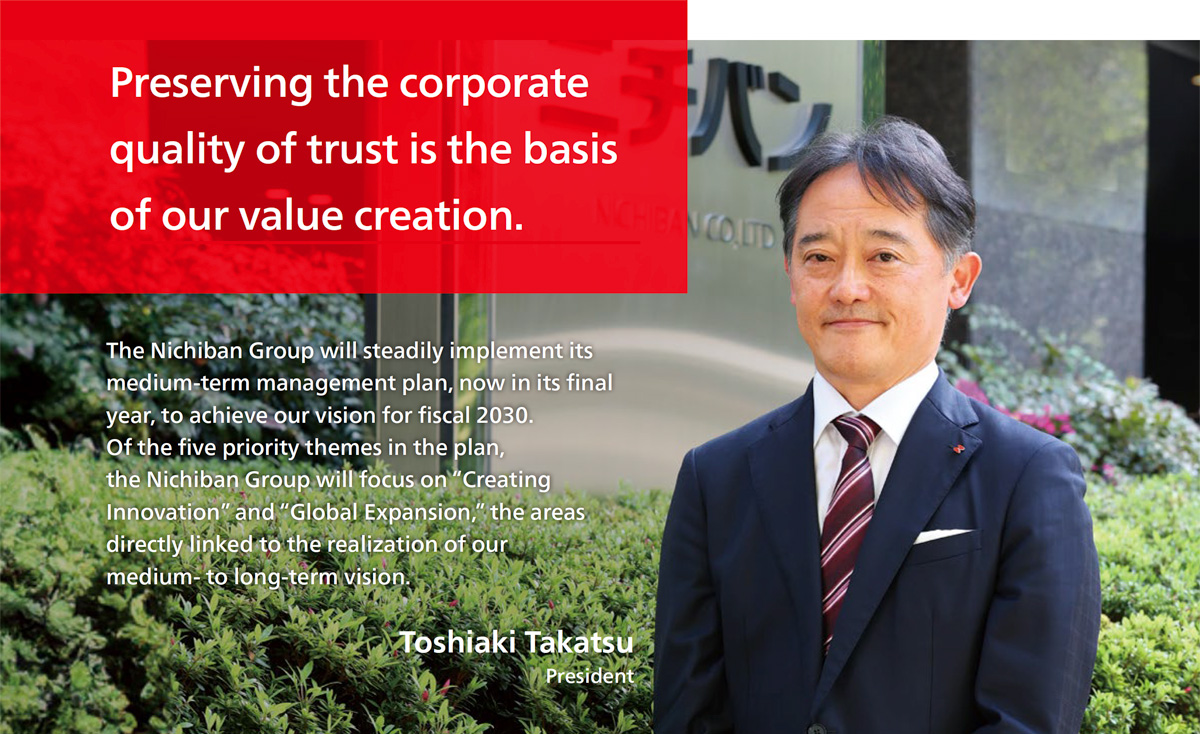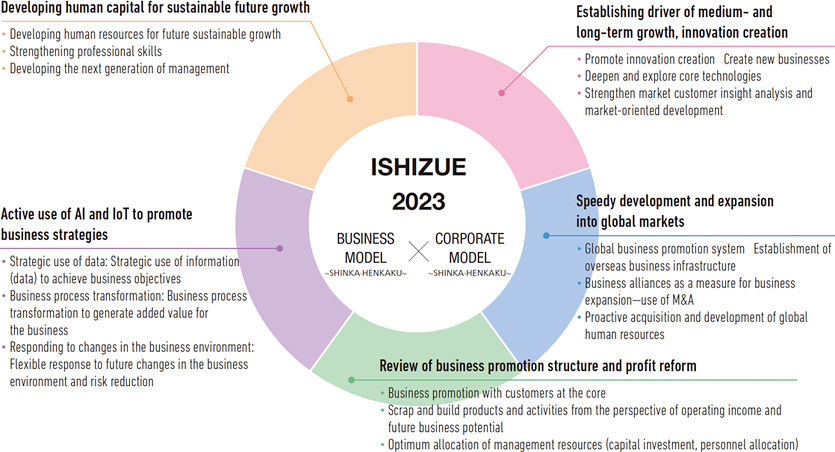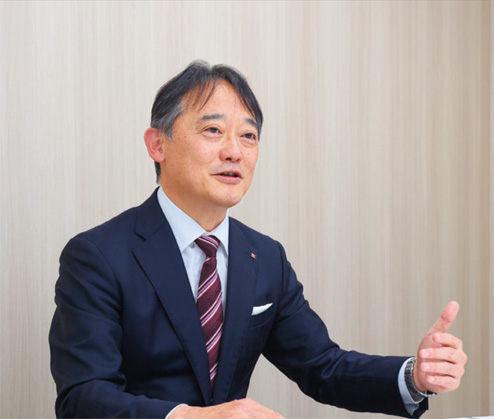Message from the President

This is the first time that the Nichiban Group has issued an Integrated Report. What is your purpose and aims?
Our main objective is to enhance non-financial disclosure, such as the characteristics and direction of the Nichiban Group, and our sustainability initiatives as a listed company in Japan, not only disclosure of financial information already provided, and to create a tool for stakeholders. Our corporate name Nichiban, as well as products such as cellulose tape, CARELEAVES™, and ROIHI-TSUBOKO™ have a certain level of name recognition, but at times we felt that we were not fully communicating our characteristics as a company, or what we aim to achieve. We decided that for people to better understand Nichiban, we needed to be more proactive in our communication. I think it’s particularly important to draw connections between what we are doing now to achieve our goals for the future and so I expect communicating this message both within and outside the company will enhance understanding of the Nichiban Group.
We also hope to use the report as a communication tool to receive feedback from stakeholders.
Please explain Nichiban’s mechanism of value creation, along with its features and strengths.
The Nichiban Group’s strength lies in its proprietary adhesive technologies accumulated over more than a century in business. These core technologies have been applied to develop a wide range of products in the tape and medical fields, and by providing solutions for a wide variety of issues we have achieved stable earnings and contributed to society. That is Nichiban Group’s value creation process. There are also factors that differentiate us from competitors, such as the low environmental load of products such as cellulose tape owing to the use of natural materials. In the medical field, where items are applied to the skin, Nichiban products are characterized by functionality that makes them well suited for human skin, such as preventing rashes and breathability to prevent stuffiness. In addition, our products for industrial applications require a variety of characteristics depending on each application, and Nichiban is highly regarded for its adhesive technologies and a wide range of support mediums to meet specific needs. A further strength is the relationships of trust with suppliers that we have built over many years, and our strong customer base. The Nichiban Group is as committed to corporate quality as it is to our product quality. We believe that preserving our corporate quality of trust that has endured for more than a century will continue to be the basis of our value creation.
When you were appointed president in 2019, you announced a new medium- to long-term vision, and a medium-term management plan. What was the background to this announcement?
The Nichiban Group celebrated its 100th anniversary in 2018, so 2019, when I was appointed president, marked the start of a medium-term management plan for the next 100 years. Before becoming president, I had been involved with preparing management plans as team leader, so when it came to formulating this present medium-term management plan, I felt that we should first clarify the direction we are heading for the next five years. Furthermore, since we needed to show the connection between how we want to be in the further and what we should do over the next five years to achieve it, we positioned the medium-term management plan as the means to realize our medium- to long-term vision.
The medium- to long-term vision “The NICHIBAN GROUP 2030 VISION” began with discussions on what we wanted the Nichiban Group to be in 2030 (12 years from the time of its formulation), and what it should be. As the domestic market matures, in a bid for sustainable growth, we decided that we wanted to be a manufacturer that contributes to society globally, and that so long as we are a manufacturer, we would continue to regularly generate new value and technologies. We adopted the slogan “Continue to create value that supports a comfortable life, and become a company that contributes globally,” and set a clear direction with ratios of 30% new products and 30% overseas sales. There were some less than positive reactions at first, questioning who would be responsible and how to achieve these goals, but now that we have shared and spread this vision, I feel that we have begun to foster a mindset among employees of making their work their own.
The current medium-term management plan “ISHIZUE (foundation) 2023 ~SHINKA (evolution/deepening)·HENKAKU (reform)~” is focused on laying the foundation to bring us closer to reaching our goal for 2030. The plan has five priority themes: 1) Creating innovation; 2) Global business development and expansion; 3) Revision of the business structure and profit reform; 4) Active use of AI and IoT; and 5) Human resource development. The first two themes in particular are directly linked to the realization of our medium- to long-term vision, so we have positioned them as engines for future growth. In addition, along with profit reform through such means as consolidating unprofitable business divisions, rather than simply separating business segments into “medical” (products affixed to people) and “tape” (products affixed to things) as we have up to now, to strengthen business centered on customers, we are conducting more customer-focused sales activities, seeking out new development projects and working to expand our customer base.
That is, in terms of medical products, there are healthcare products for the general consumer (B2C), and medical products for hospitals (B2B). The same is true for tape products. We have revised our business structure to be more customer focused, in line with the Nichiban Group Philosophy and values of listening to each customer, and providing them with solutions. Further, we are actively investing in IT and pursuing human resource development to support these activities.

The medium-term management plan is in its final year. What are your thoughts looking back?
It’s been four years since the start of the plan, and the business environment continues to be severe. Along with the impact from the COVID-19 crisis, an event we of course did not anticipate at the time the plan was formulated, business performance has been hampered more recently by supply chain disruptions, and rising material and energy prices. Nevertheless, although there have been some areas where we were unable to function fully due to restrictions necessitated by the pandemic, I believe that overall, we have made steady progress with each priority theme, laying the foundation for the future.
For creating innovation, one of our engines for future growth, while we have not yet reached the stage of launching new businesses, we are pursuing various initiatives focused on how to make use of Nichiban Group’s core adhesive technology. Especially in B2B areas such as products for hospitals and industrial applications, we have seen the benefits from revising the business structure. I feel that we have established a development system able to directly utilize customer feedback to determine the type of use and where there is demand, and offer business proposals. Also, in terms of open innovation, we are making Nichiban technologies openly available to solicit ideas for novel uses, with the aim of finding partners for collaboration, including outside start-up firms. There are undoubtedly applications and functions that we have not recognized, and going forward it will be important to focus on co-creation with partners, rather than maintaining the policy of self-sufficiency that we have up to now. In the next medium-term management plan, we will aim to link our activities up to now with creating new value.
For the other growth engine of global business development and expansion, in October 2020, we established a sales subsidiary in Dusseldorf, Germany, putting in place a structure with three bases (Japan, Thailand, and Germany) covering East Asia, Southeast Asia, Oceania, and Europe. Although Europe is a difficult market, the fact that we have been able to directly approach local customers and develop business based on market feedback bodes well for future product development. As for our target overseas sales ratio, despite continued negative external factors, figures are steadily rising, and our sales subsidiaries in Thailand and Germany have already achieved profitability. However, due in part to the impact of restrictions on activities during the pandemic, we still have not fully established a system for further expansion, and need to increase the number of business bases overseas, including production and logistics. We will continue to consider M&A as a key strategy to achieve this.
The Nichiban Group has made steady progress in other areas as well, including enhanced productivity with the introduction of IT systems, human resource management utilizing the Workplace Engagement Improvement Project, and environmental investments for desolventization.
What are the characteristics and effectiveness of Nichiban’s corporate governance system?
The Board of Directors comprises eight members, four of whom are outside directors. In March 2021, we established the Nomination and Remuneration Committee, along with other measures to ensure independence and transparency. I am in a supervised position, and I am confident that investment projects such as M&A, for example, are conducted with sufficient deliberation, including opinions and questions from various perspectives, as well as advice based on a wide range of experience, including the basis and background for specific decisions. I often receive advice from outside directors to be “bold yet cautious,” which I think is an apt phrase, as governance should be effective in terms of both offense and defense. In addition to assessing the effectiveness of the Board of Directors through questionnaires and other means, we also conduct multifaceted evaluations that include executive officers. Further, we have introduced a system to ensure that every corporate officer understands the issues, and the system allows officers to reflect on their own performance.
The Board of Directors reports and discusses general management policies and risk management, but another important theme is sustainability initiatives to support Nichiban Group’s continued growth, such as measures to cope with climate change and solutions to societal issues. How to preserve corporate quality, which I mentioned earlier, is a particularly important issue for the Board of Directors. Further, the addition of a female outside director since the previous fiscal year has provided us with candid comments and opinions regarding such issues as initiatives for women’s empowerment, human resource development, and workplace safety, ensuring firm support for our activities and business foundation.

Considering future changes in the business environment, what do you perceive as the risk factors and growth opportunities?
Along with the maturation of the Japanese market, the decline in the working population, and geopolitical tensions, one of the risk factors for the Nichiban Group, which consumes resources in its production activities, is delay in implementing environmental measures. Most recently, rising raw material and energy prices, along with disruptions in the supply chain, have had a significant impact on business performance. In addition, because the Nichiban Group uses materials manufactured from naphtha for its products, we need to consider procurement risks as structural issues, such as rising costs stemming from reduced production of the raw material due to environmental measures, or delays in supply. Further, a logistics problem in delivering products to customers has become an issue we need to address. We have established Supply Chain Division to centrally manage these procurement and logistics risks, aiming to further strengthen communication with suppliers and logistics companies, and deepen cooperation.
In terms of growth opportunities, medical products such as CARELEAVES™ and ROIHI-TSUBOKO™ are currently key sources of earnings, but considering the various issues in the mobility field, such as autonomous driving and weight reduction, I believe there is potential to expand the scope for utilizing the Nichiban Group’s core technologies to products for industrial applications, an area in which I had been personally involved. There are also sectors we have yet to develop, such as civil engineering, to address societal issues including solutions for aging infrastructure. We plan to explore possibilities through various routes such as academic conferences. In medicated products, developing business in fast-growing emerging countries is a major growth opportunity. As standards of living rise, consumers tend to favor products with higher quality and functionality. The time will surely come when Nichiban Group’s core technologies and commitment to quality will be major advantages. Returning to Japan, the aging society also presents an opportunity for medical products. For example, in the field of home medical care and nursing care, there is growing demand at home for using the same items used in hospitals. In the case of the Nichiban Group, the fact that we have sales channels for both products used in hospitals and products handled in drugstores will be our strength. As Japan will experience an aging society before other countries, if we are successful here, we will consider using this as a model case to expand business overseas.
Finally, what message do you have for stakeholders?
The Nichiban Group celebrated its 100th anniversary in 2018. Looking ahead to the next 100 years, we have renewed our basic philosophy, adopting the phrase “Nichiban respects people’s cooperative relationships and strives to foster prosperity and happiness for all stakeholders of Nichiban Group.” We aim to be a company where all employees work together to continually create value that supports comfortable lives. A wide variety of feedback from customers who use our products, and from all stakeholders, will be a major driving force in our success. We look forward to hearing your candid opinions, and ask for your continued support.
